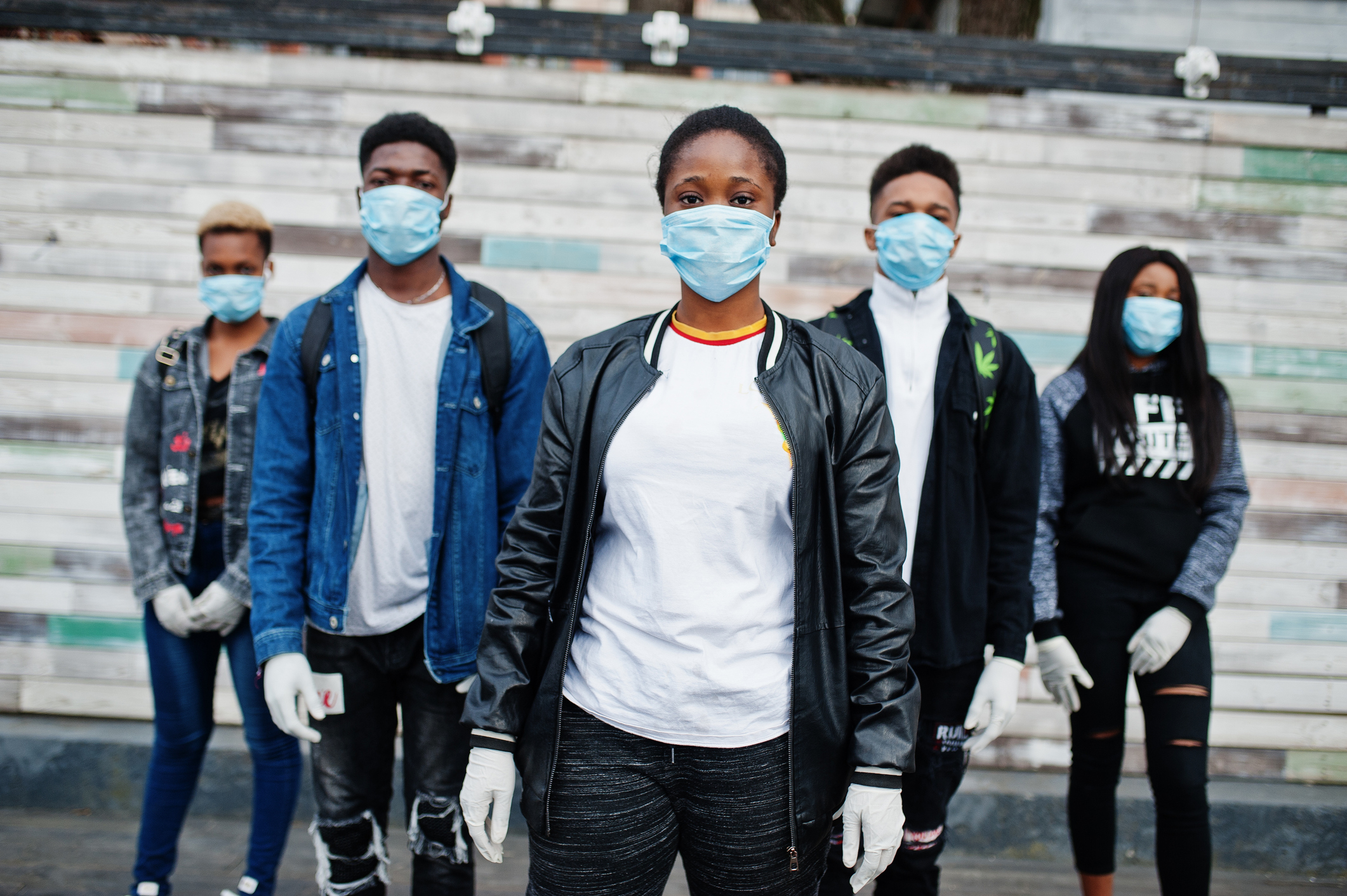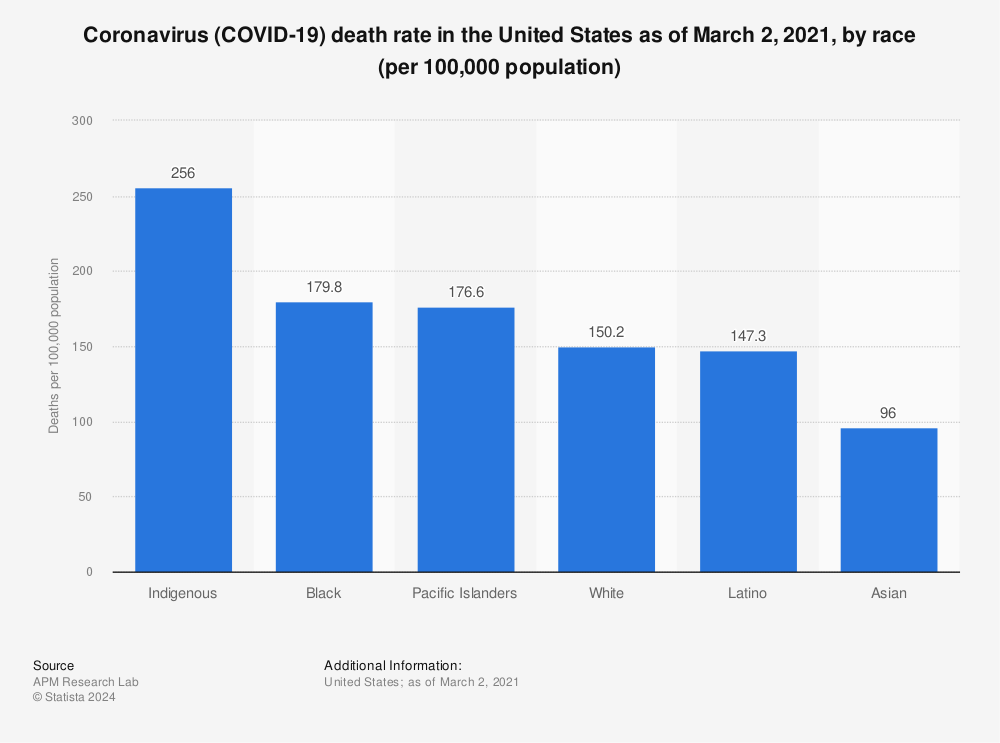“This pandemic has magnified every existing inequality in our society – like systemic racism, gender inequality, and poverty,” - Melinda Gates
 |
| Credit: Getty Images |
When the clock struck midnight on January 1st, 2020, there was a sense of optimism for the new decade. Based on how prosperous the 1920’s were in America, many people were expecting the roaring twenties of the new millennia. Unfortunately, 2020 swiftly turned into a year unlike any seen before in modern times. The Coronavirus quickly turned into a pandemic, rendering everyone confined to their homes and unclear on the future of humanity. Factor in the murder of George Floyd and the protests for both him and Breonna Taylor that summer, higher rates of infection among BIPOC, along with an increase of targeted crime against Asian Americans, it is obvious that marginalized groups during this pandemic have experienced a lot. However, African Americans were facing Covid-19 related deaths at a disproportionate rate, which highlighted how the U.S. continues to fail African Americans . It is abundantly clear that this pandemic severely impacted the black community at a disproportionate way, but why? How else was the black community affected by the pandemic? Now that we are almost three years into this pandemic, with infection rates and deaths notably reduced, how is this community healing?
Covid-19's Impact
While this pandemic has been difficult for everyone regardless of socioeconomic status or ethnicity, the truth is that African Americans have experienced more hardships than normal. There is a wide gap between White Americans and BIPOC, regarding covid related deaths. According to APM Research Lab, black Americans are dying at twice the rate of white Americans. For Black Americans there have been 179.8 deaths per 100,000 (apmresearchlab.org).
 |
| Credit: APM Research Lab |
Poverty
There are many factors that have caused such a considerable disproportionate effect during this pandemic. Racism/discrimination being the biggest reason, considering this is the base of the disparities in all other aspects such as social, political, and historical. Poverty is a major contributor to covid related deaths. Since poverty amongst the black community is a direct result of the racial hierarchy within this country, this is part of why deaths are so much higher than almost any other demographic. Racism and classism affects where people live, what jobs they get, how much money they make, and where their money gets spent. Opportunities are lost, jobs are passed up, wages are lower compared to their white counterparts, and renting/buying in certain neighborhoods is denied based on race. And since low income neighborhoods live in more densely populated and multigenerational households, this creates an environment for diseases like Covid-19 to more easily spread than in middle class or wealthy neighborhoods. Not to mention lack of access to doctors causes the situations to worsen.
Lack of Access
Racism in the medical field is also worth noting. Bias in nurses and doctors have a significant role on the life and death of patients (NIHCM.org). Before the vaccines were available, when someone contracted Covid-19 and the symptoms were more severe, they would go to hospitals to be treated. There have been numerous articles detailing the horrific treatment of black and Latinx American groups in hospitals by medical staff. “Black Covid patients are less likely to receive medical follow-ups after being hospitalized and more likely to experience longer waits until they can return to work” (NBC.com). When doctors and nurses neglect their patients based on their race, this solidifies the positionality that keeps minority groups, like African Americans, marginalized.
Racially Motivated Crimes
The coronavirus has affected us beyond just trying to stay healthy. After the major social movements that have happened the past two years of this pandemic, there have been moments of reflection and clarity for many. There have also been moments of unnecessary hate and targeted isolation that have affected our communication due to conflict. When Covid-19 was first discovered, no one really thought it would lead to a global pandemic. When people realized the severity of this disease and how easily it spread, fear took hold. Which is why the brutality against George Floyd in the midst of Covid-19 confusion was so jarring.
 |
| Credit: Getty Image |
While BLM has been active since July 2013, the height of the movement were the George Floyd protests. When George Floyd was murdered by a police officer on May 25th 2020, people from all over the world were outraged. The brutal manner in which George was murdered and by who, led to one of the most widespread and emotionally charged protests the world has ever seen. From the United States to France to England to South Africa to Japan, people marched in protest of police brutality. This led to other unjust killings at the hands of police to come to light, like Breonna Taylor’s murder. While Black Lives Matter has been at the forefront of protests against police brutality for years, this murder was a turning point for the movement. People had had enough, especially black people. There is an extremely wide gap in police shootings involving a black person versus a white person. Unarmed black men are more likely to be shot and killed than white men. “The rate of fatal police shooting among Black Americans are much higher than that for any other ethnicity” (statista.com). This fact coupled with the knowledge that most of these police officers will not even be charged for the murders, has led to palpable tension between the African American community and the law enforcement community.
 |
| Credit: Getty Images |
Since police officers are among the law enforcement community, in retaliation to the Black Lives Matter movement, police officers and supporters of officers created their own movement known as Blue Lives Matter. At all Black Lives Matter protests, Blue Lives Matter will protest against them, which has created conflict at these protests which in turn creates more conflict with black people.
Community Response
I approached several members of the community and asked their thoughts about Covid-19 and if they believed that the virus intensified already existing issues within the community.
|
Donyae found the current socioeconomic state of the Black community to be a concern. He expressed that these issues of poverty and violence have been present for decades, but seems to be worsening in recent years. He attributes part of the blame to Covid-19. "A lot of people around here were laid off and having more debt because they couldn't pay bills or rent. People were getting sick with the virus too especially old people". Donyae is not the only member who felt this way.
"I have a serious problem with these cops and how they treat black people. Not just black men but women too." - Mary, lifelong LA resident
Mary agreed that Covid had heightened community issues, especially with law enforcement. "I couldn't understand how at the beginning of something the world has never seen before, we still gotta deal with racism on top of it". Mary is referencing the George Floyd murder that occurred less than three months into the pandemic. When asked how she thinks tensions between the black community and law enforcement could be mitigated, Mary stated that not only is communication important, but more funding towards programs to help police uphold their sworn duty to better protect his community is key. Since the aftermath of the Summer 2020 protests, more states are implementing training programs such as implicit bias training, so that officers are less likely to target citizens based on race. Mary believes that officers becoming more familiar with the members of the communities and having more open dialogue with the people they are sworn to protect would help prevent conflict, along with a more rigorous vetting process of people who want to become police officers. According to Andrea, while this is a start, there is more that could be done. |
 |
"If all Americans would just acknowledge racism head on, we would overcome so many problems." - Andrea, lifelong LA resident |
To Andrea, the only way to actually help alleviate tensions and potential would firstly be to address the root cause of the problem, which she believes is racism. Andrea is certain if society prioritized recognizing and educating themselves on the privileges that white supremacy affords white people, along with learning to unlearn cultural biases and having more empathy for others, this would better help strengthen intercultural relations throughout this country. She has hope though. "We are resilient and strong, we just need to continue to persevere and fight for equality." |
Why This Matters
As an African American woman, I recognize the disadvantages my identity can have depending on who I am being perceived by. However, I am so much more than the labels society places on me, which is a sentiment many other black people share. I was born and raised in Los Angeles, and have seen the tumultuous, varied impact the pandemic has had on my community first hand. While the pandemic has slowed down and things seem to be relatively back to normal, I find that I don't want things how they were; I want things improved.
 |
| Credit: National Education Association |
References
“Color of Coronavirus: COVID-19 Deaths Analyzed by Race and Ethnicity.” APM Research Lab, 5 Mar. 2021, www.apmresearchlab.org/covid/deaths-by-race.
Phillips, Kynala. “Black Covid Patients Receive Fewer Medical Follow-Ups, Study Shows.” NBC News, 8 Oct. 2021, www.nbcnews.com/news/nbcblk/black-covid-patients-receive-fewer-medical-follow-ups-study-shows-rcna2774.
Statista. “People Shot to Death by U.S. Police 2017–2021, by Race.” Statista, 30 Nov. 2021, www.statista.com/statistics/585152/people-shot-to-death-by-us-police-by-race.
“Systemic Racism & Health Care, COVID & Treatment.” NIHCM, 1 Dec. 2020, nihcm.org/publications/systemic-racism-health-care-covid-treatment.





No comments:
Post a Comment